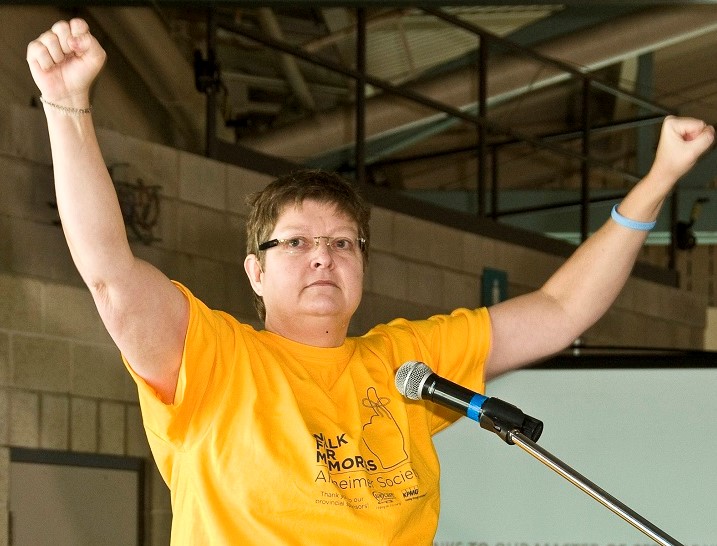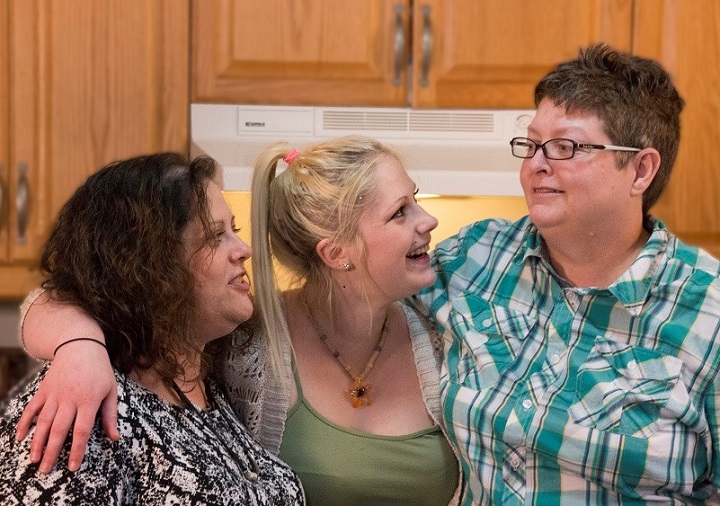Canadian-born Mary Beth Wighton, has been living with frontotemporal lobe dementia since 2012 when she was diagnosed at age 45. Two years later, she co-founded the Ontario Dementia Advisory Group (ODAG) with the mission of influencing governmental policies affecting the rights of people with dementia.
 “Since the formation of ODAG,” Mary Beth says, “members have been working tirelessly to address the human rights of people with dementia.” For too long, people with dementia were voiceless and unseen. As chair of ODAG, Mary Beth adds, “We decided that each of our board members must have some form of dementia; however, our membership is open to people who also have MCI [mild cognitive impairment].”
“Since the formation of ODAG,” Mary Beth says, “members have been working tirelessly to address the human rights of people with dementia.” For too long, people with dementia were voiceless and unseen. As chair of ODAG, Mary Beth adds, “We decided that each of our board members must have some form of dementia; however, our membership is open to people who also have MCI [mild cognitive impairment].”
“Why no PWoDs? While Kate Swaffer, CEO of DAI and I have discussed this, I want to hear your answer, too.”
We laugh about the use of PWoD, after I explain how the acronym came to be – People WithOut Dementia. She makes a note of it and then explains.
“There’s a lot of support for PWoDs [gotta love her using the acronym] but less specific support for people living with dementia. The big thing that separates ODAG from other organizations is that we manage ourselves. We believe in our own strengths… we want to capture and draw on our own strengths. Besides, PWoDs truly can’t understand.”
I ask, “What’s it like living with frontotemporal lobe dementia, Mary Beth?”
“As the chair of the dementia advisory group, sometimes, it’s challenging with our different dementia symptoms. If I act out or become too emotional… forget about everybody else – the doctors, those who write about us… we have to be careful that we don’t act out so we can work together.”
And then she laments the lack of newcomers stepping up to serve in leadership roles.
Need More People with Dementia as Advocates
“When I look at what’s happening in the professional world of dementia advocacy, our momentum is declining. A lot of the leaders who have helped move this forward are moving later in their disease. Who will take the baton? [Due to symptoms of our progressing dementias] we are offended easier… we don’t communicate as easily as we used to. We forget we have a scheduled meeting. We need new leaders to come in and help us so we can retire. I am concerned.”
This is the major issue we discuss during our video conference call – the need to find people who have a dementia diagnosis who are willing and able to participate as advocates.
“Why do you think people with dementia are not participating in advocacy roles?”
“It could be one of three issues at play,” Mary Beth explains.
“One, they lack knowledge of ODAG.”
“Two, many people are older when they are diagnosed.” She hesitates and admits, “How do I put this delicately? This generation was exposed more severely to the stigma of dementia. They hold onto these memories and don’t want to expose themselves and their families.”
“Three, some people don’t want to do it. They say, ‘I want to focus on my family… on living my life.”
“We have seven board member seats and three of them are filled. We need to fill four more.” She accepts her role for this void, “This is a failure on the part of ODAG to recruit people and pull them up through the ranks.” She adds, “I’d like someone to be ready to take my place, too.”
Prior to Mary Beth’s Diagnosis
“Prior to my diagnosis and for the first ten years, I worked for an IT company as a Senior Business Analyst. I traveled around the world – to Africa, Argentina, Brazil, Mexico, Ireland, England, Italy, Australia. I worked long hours and met many different types of people.”
“Before my diagnosis, I was running an engineering recruitment business with Dawn, my partner, and a business partner. I was making huge financial decisions. Most of them were wrong. I financially ruined Dawn and I, but didn’t tell her. A lack of ability with finances… lack of ability to lead a group. I went from leading international groups to not even being able to lead five people. My doctor put me on a leave of absence.”
Diagnosing Medical Professionals Still Lack Compassion
“At a geriatric hospital ward, I was diagnosed with probable FTD at 45 years of age. [Imagine that.] After a follow-up diagnosis, there was a significant decline.”
“How did you react after you received the diagnosis?”
“I felt relief.”
“Then the doctor turned to Dawn and said, ‘She’s going to die in six to eight years.’ Turning to me, she added, ‘And effective immediately, your license is revoked.’”
“I got up and walked out, after slamming the door really hard. All I could think of is what do you mean I can’t drive? You mean I can’t drive downtown? Dawn joined me and we were in shock. I handed her the car keys.”
“There is such a lack of empathy and understanding… even today.”
“This is one of the reasons ODAG decided to be a political group… to help set policy.”
How She Spends Her Vacation
When The Caregiver’s Voice reached out to Mary Beth to interview her for the VOICES with Dementia column, we received an automated reply that she was on vacation for the month of August. Not for long. The following week, we connected via Zoom for an hour-long interview that lasted almost 90 minutes.
“How do you spend your days, Mary Beth?” I asked.
“Like this,” she replied.
“One of the things we’ve done, because we recognize that we need to work together, is to invite partners. We work with two different types of partners – those that work with our infrastructure and those who work with research projects. We consider them our equals with different skills sets.”
“There are groups out there where people can go for support… but no group that goes to the Canadian government and says, ‘You are having a Canadian National Dementia Strategy and you haven’t even talked to us.’ If we are not banging on the doors, we won’t be heard. And we need more doctors trained to show compassion [when diagnosing a person with dementia].”
“The government of the province of Ontario plans to fund ODAG to help train those at the frontline working with people with dementia.”
At the end of our call, she realized she had five minutes before her next call.
Today, at age 50, she and her partner of 16 years, Dawn Baxter, make their home by a lake in Southampton, Ontario after raising their daughter, Brianna, age 22. Together, they are helping bring awareness of dementia while leading with initiatives for human rights. Sadly, they still suffer pockets of stigma – for being a family with dementia.
Thank you, Carole Mulliken for referring The Caregiver’s Voice to Mary Beth Wighton.
For more information about Mary Beth Wighton, visit:

















Carole, first of all let me thank you for all the work you have done and continue to do to educate people about dementia and further the cause.
In addition to the reasons mentioned above, I don’t think people believe that they have anything left to offer or that they can participate in advocacy activities. When diagnosed there is so much information about what you can no longer do that I think people with dementia often think they have lost their value to society. This is absolutely incorrect and a shame that people are taught this standpoint.
I know people that have either lost their ability to speak or have a great deal of difficulty with it, but they forge ahead and continue to become involved in advocacy efforts.
I think as a mentor it is my responsibility to invite people to become advocates. One of the people I mentor was recently treated very poorly in an emergency clinic at the hospital. They drilled her for information she was temporarily unable to provide because of her dementia and seizure. She turned around and told me that she wanted to go back to the hospital and give them some training materials on dementia. I was so happy.
People can always help the advocacy program in one way or another, and we should be prepared to encourage them to do so.
Paulan, thank you for these words of encouragement for people with dementia.
Thank you also for your testimony about your mentee’s courage to help medical professionals be more aware.
I am ready to help and I would like to collaborate from my area in Miami, FL. I am a Home Health Nurse; Therefore, I am very involved in this situation in my daily work. I understand there is a serious lack of support for patients, caregivers, and general speaking for all people working with them, such as aids, nurses, therapists, etc. Thank you for mention the topic and for gives us the opportunity to analysis about it.
Gladyslene, thank you for your offer to help.
Be sure to visit the ODAG site and contact them to see how you may collaborate.
Brenda
P.S. Please be safe during Hurricane Irma’s (unwelcome) visit.
Mary Beth is so correct that it is very difficult to identify and train people with dementia for advocacy leadership. First, of course, is that not everyone is called to advocacy. Early on, it is enough to learn to cope with one’s own incapacity, and going through the stages of grief is part of that. Others are not willing to confront the stigma of dementia. However, another factor is not so evident.
The over-medicalization of lessened cognitive capacity assures that HIPPA laws isolate people with dementia. However well-intentioned and beneficial they are in some respects, they assure that people with dementia are never introduced to others coping with diminished cognition like themselves. Just as breast cancer patients need other breast cancer patients, and diabetics need other diabetics, and PTSD survivors need others who share their experiences for psycho-social support and healing; so do people with dementia. Support groups provide a sense of belonging (or groupness), role models, education and friendship for those isolated by their diseases and experiences.
How is it that people with dementia are not offered psychosocial support? Experts report that MOST people with dementia suffer, not so much with dementia, but with the extreme isolation that results from it. Doctors who diagnose easily write prescriptions for drugs which may improve cognition to some degree. Why can they not refer to psychosocial support groups?
Carole, thank you for these thought-provoking comments about people with dementia trying to first deal with the diagnosis and then the stigma.
Yes, psychosocial support is key… not only for people with dementia but for their caregivers as well. Support groups often serve as LIFE-support groups.
Very insightful information. Thank you. Keep posting such more.
PapayaCare – Assisted living.